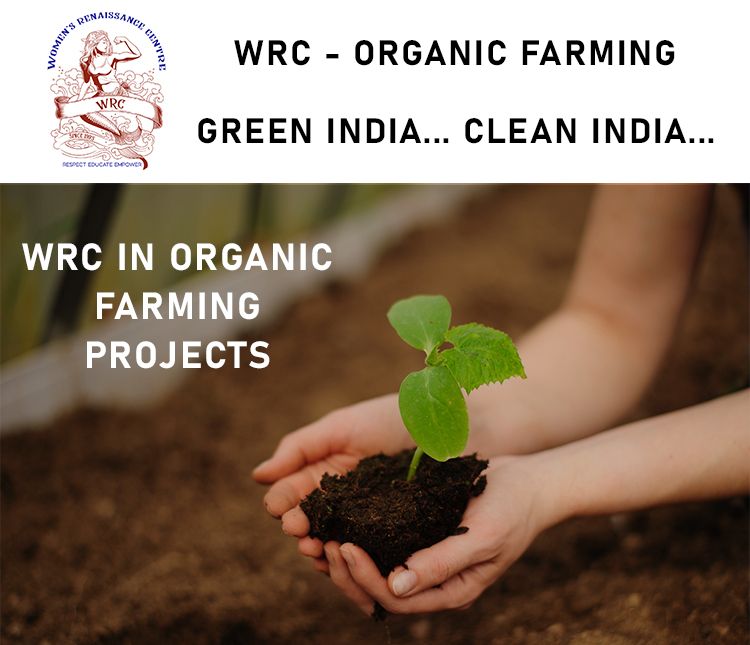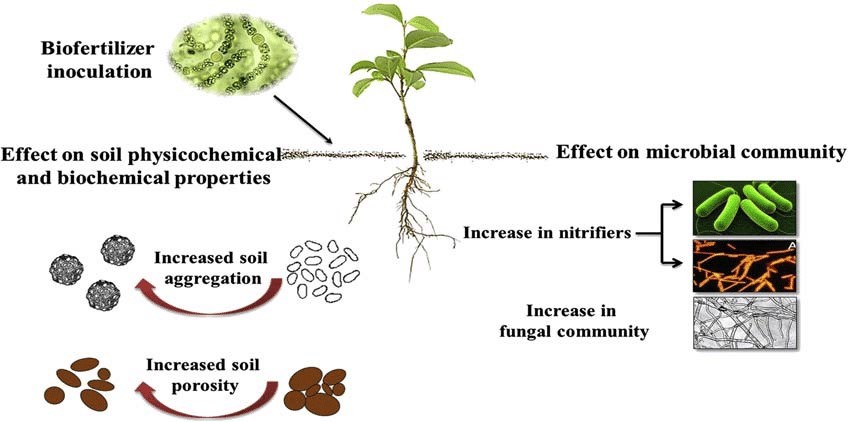Agriculture is considered as the backbone of Indian Economy. It plays a strategic role in the process of economic development. Growth in agricultural sector may be well judged by the increase in the agricultural production over time.
As we know that plants require water, sunlight, oxygen, and nutrients for their growth and development, but there are some factors which we provide to plants are harmful for their health, hence there is need to avoid those factors.
Since the introduction of the scientific agriculture, farmers and consumers have lacked awareness and information on the danger posed by chemical substances on the conventionally growth products of the growers, consumers and the environment. The conventional agriculture has provided for the usage of toxic materials in crop protection without putting into account the other problems they will generate and their effects.
Organic farming works in the harmony with the nature rather than against it. It uses environmentally sound techniques for raising crops and livestock that are free from synthetic compound. The methods used in organic farming seeks to increase long term soil fertility, balance insect and organism population and reduce air, soil and water pollution while maintaining or increasing levels of production.
It includes various processes like crop rotation, green manure, organic waste management, biological pest control, etc.
INDIA NEEDS ORGANIC FARMING
The main reason farmer’s state to farm organically is their concern about working with agricultural chemicals in conventional farming systems.
As many farm chemicals require energy intensive manufacturing processes that rely heavily on fossil fuels, there is an issue with the amount of energy used in agriculture. Organic farmers find their method of farming to be profitable and personally rewarding.
In organic production, farmers choose not to use some of the convenient chemical tools available to other farmers. Special attention is being given for choosing crop rotation and tillage practices to avoid or reduce crop problems.
Cereal and forage crops can be grown organically relatively easily to due to relatively low pest pressures and nutrient requirements. Corn is being grown more frequently on organic farms but careful management of weed control and fertility is needed. Meeting nitrogen requirements is particularly challenging.
Fruit and vegetable crops present greater challenges depending on the crop. The yield reduction varies by crop and farm.
The issues that surround the development of these undertaking are:
Reversions – some of the trained farmers might revert back to their traditional ways of farming that is conventional farming.
Weather conditions – Large number of our target group relies on rainfall for their agricultural activities which has of late been groped by erratic weather thus interfering with farm implementations.
Commercial interference – some merchants promoting their synthetic products and transgenic seeds might influence the farmers’ perception. This in many cases might happen to individual farmers who are in search for making quick gains.
Group disintegration – trained and sensitized community members might be unable to hold together onto their easy groupings making it hard to follow up and sharing ideas. “The charitable give out at the door, and God puts in at the window.”
OUR PROJECT INCLUDES
Making and using manure and compost to offer long term soil fertility, bio intensive gardening methods for soil enhancement. The methods of soil conservation are;
Crop rotation and farm management
Crop diversity – companion planting and deterrents ecological pest management
Agro forestry and environment conservation, husbandry, water harvesting in relation to animal welfare
Nutrition through promoting high nutritional crops, indigenous food farming and organic marketing techniques
The primary aim of our organic farming is to motivate selected organic farmers and organize them with all the needed support. WRC will enable these entities and also which strengthen the organic agriculture group activities through various modes which is the main objective of the project.
METHODS AND TECHNIQUES OF ORGANIC FARMING
Crop Rotation: A technique to grow various kinds of crops in the same area, according to different seasons, in a sequential manner
Mulching: It is a process of covering the soil and making more favorable condition for the growth, development of the plant.
Bio-fertilizer: There are substances which contain living micro-organisms which when applied to seeds, plant surfaces, or soil, colonize the rhizosphere or the interior of the plant and promotes growth by increasing the supply or availability of primary nutrients to the host plant.
Green Manure: Refers to the dying plants that are uprooted and stuffed into the soil in order to make them act as a nutrient for the soil to increase its quality.
Biological Pest Control
With this method, we use living organisms to control pests with or without the use of chemicals.
Compost
Highly rich in nutrients, it is a recycled organic matter used as a fertilizer in the agricultural farms.
Management of Soil
Soil management is the soul of organic farming. It’s a well-known fact that after taking one crop, the soil of the farm loses most of its nutrients and its fertility goes down. To process of recharging the soil with all the necessary nutrients is called soil management.
Limitation:
Organic manure is not abundantly available and on plant nutrient basis it may be more expensive than chemical fertilizers if organic inputs are purchased.
Production in organic farming declines especially during first few years, so the farmer should be given premium prices for organic produce.
The guidelines for organic production, processing, transportation and certification etc are beyond the understanding of ordinary Indian farmer.
Marketing of organic produce is also not properly streamlined.
PROJECT DESIGNING
In the Project Designing stage, we make the Project Design with keep in mind the local climate conditions and circumstances, possible availability of energy, availability and quality of water etc. In this Stage, We make Structure Layout Design, Irrigation Layout Design & Planting Material Layout Design.
WRC ORGANIC VEGETABLE ROOF GARDEN
As the world is heading towards the depletion of natural resources and the loss of forest/garden area due to urbanization, there is a dire need of terrace gardens. In contrast to the traditional garden, which requires a large field to grow vegetable patches and a lot of care, small square foot garden is suitable for limited spaces.
Indeed, this way of growing vegetables greatly helps. Some everyday actions are extremely easy to maintain. You can easily manage crops, it’s so easy to water each plant in a right amount with a simple watering can. No waste, no weed and almost no to problem of pests.
OUR OBJECTIVES
IN ORGANIC FARMING
- Provide an overview of the use and critical evaluation of the need for external inputs in organic plant and animal production;
- Provide tools and techniques to reduce or gradually phase out copper, mineral oil, conventional manure, antibiotics and synthetic vitamins, while building on previous projects;
- Evaluate products and management practices in different peso-climatic and farming conditions in Europe, Tunisia, Egypt and Lebanon;
- Develop roadmaps for phasing out contentious inputs together with organic farmers, advisors and industry, scientists and policy makers;
- Reach out to farmers to ensure effective dissemination and adoption of the tools and techniques through farmer advisory networks in eleven European countries.
- To increase genetic diversity and to promote more usage of natural pesticides will control pests, diseases and weeds.
- To ensure the right soil cultivation at the right time, Keep and build good soil structure and fertility.
- To create awareness to the society about the importance and benefits of organic food
- To promote and transfer efficient technology to improve organic cultivation through continuous R&D support
GREEN TERRACE GARDEN
- We focus on this project due to many benefits to the society of these terrace gardens, such as women economic empowerment, waste recycling, ecological benefits, energy conservation, water conservation, decorative enhancement of buildings, occupant’s health benefits and attracting birds and insects.
- A lot of space in terrace is not been utilized and if you optimize it well, you’ll be able to cultivate enough vegetables for home use, fresh and organic.
- To establish more number of terrace greens to provide healthy chemical free & balance nutrition. Due to these gardens ambient temperatures will be maintained in surroundings.
- Establishing more Green gardens within the city limit modifies micro climate and thus reduces global warming.
- Our own GAUSHALA produced Bio-Fertilizers can be effectively utilized for these projects.
- We are planning to develop maximum 100,000 terrace gardens in Chennai and surrounding cities, which will support the society Clean and Green.
- We will create 1000 new job opportunities for the women as Development Officers. Each officer will monitor 100 terrace gardens establishments. Educate, support developing and maintaining terrace garden, periodical inspection, to collect produced vegetables to our cold storage.
- We buy the produced vegetables and market the same by our trust, which will support those 100,000 families economically.
- We establish sufficient cold storage facilities to store and sell the produced vegetables.
- We also plan to develop 100 WRC GREEN STORES – Organic Fruits and Vegetable Stores maintained by women to sell this produced vegetables and fruits, which will again create 3X100 = 300 job opportunities for Women.
EMPLOYMENT DIRECT AND INDIRECT OPPORTUNITY TO BE GENERATED










Comments are closed.